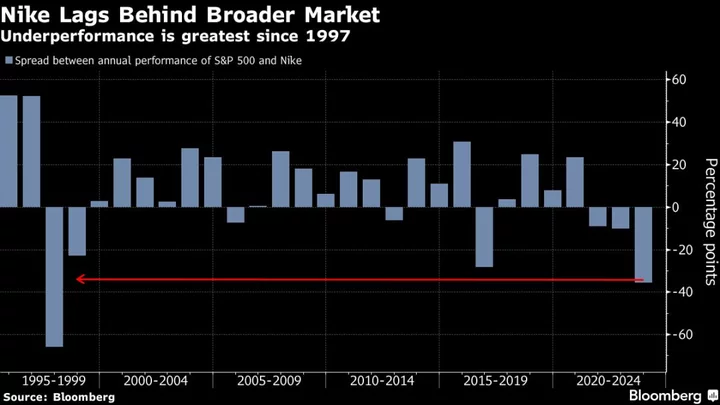
National Park Closures in Shutdown Could Ignite Partisan Feuding
The Grand Canyon. Joshua Tree. The Great Smoky Mountains. America’s 85-million-acre National Park System houses some of the
2023-09-29 18:48

National Coffee Day deals: Free drinks at Dunkin', Krispy Kreme and more
For tired workers, this Friday is arguably the best day of the year: It's National Coffee Day.
2023-09-29 18:26

Daily activities could help lower heart attack risk, study suggests
Everyday activities like walking up the stairs or playing with children could help lower the risk of heart attack, stroke and even premature death, new research suggests. The experts found that although short bouts of incidental activity are good for you, the how long you do them for, and how vigorously makes a difference. The findings may make physical activity much more accessible to people who are unwilling or unable to take part in structured exercise, researchers say. They found that the longer the bouts of activity, the better, regardless of total activity levels. The large majority (97%) of this everyday physical activity, like walking to the bus stop or household chores, was made up in bouts lasting less than 10 minutes. In a group of people who said they did not take part in exercise or sport, short bouts of less than 10 minutes at a moderate to vigorous intensity were associated with a steep decrease in heart attack and stroke, and death by any cause. According to the findings, moving consistently for at least one to three minutes was linked to significantly more benefit (29% lower) than very short bouts of movement that lasted less than one minute. Senior author Professor Emmanuel Stamatakis from the University of Sydney’s Charles Perkins Centre, in Australia, said: “From walking up the stairs to speedily mopping the floors, in recent years we’ve come to understand that it is not just structured exercise that is good for our health, but we know very little about how these short bouts of incidental activity translate to health benefits.” He added: “The take-home message here is any type of activity is good for your health, but the more effort you put into those daily tasks and the longer you keep up that energy, the more benefits you are likely to reap. “If you are huffing and puffing and unable to hold a conversation for some of that time you have hit the sweet spot.” Lead author Dr Matthew Ahmadi said: “The idea of accruing short bouts of moderate to vigorous activity through daily living activities makes physical activity much more accessible to people who are unwilling or unable to take part in structured exercise. But as we see in this data, the length and the vigour people put into these incidental activities matters.” The risk of all-cause death and major cardiovascular events (heart attack or stroke) was 29-44% lower for activity periods of five minutes to less than 10 minutes, than bouts of less than one minute. The study, published in The Lancet Public Health, also found that the higher the amount of vigorous activity in each bout the better. People who huffed and puffed for at least 15% of the activity period (10 seconds per minute) saw the greatest benefit. Bouts of less than one minute were also associated with benefits if the above 15% vigorous activity rule was applied, researchers found. The researchers used data from wrist devices worn by 25,241 people aged 42 to 78, in the UK Biobank database, and artificial intelligence to analyse the seven-day physical activity patterns in people who said they did not exercise. The study linked these physical activity patterns with health records, following people for close to eight years to identify how length and intensity of physical activity bouts were linked to health status. Dr Ahmadi added: “This study suggests people could potentially reduce their risk of major cardiac events by engaging in daily living activities of at least moderate intensity where they are ideally moving continuously for at least one to three minutes at a time. “In fact, it appears that this can have comparable health benefits to longer bouts lasting five to 10 minutes.” Read More Charity boss speaks out over ‘traumatic’ encounter with royal aide Ukraine war’s heaviest fight rages in east - follow live From tiredness to sweating – subtle warning signs something could be wrong with your heart Breast Cancer Awareness Month: 9 brilliant beauty buys supporting good causes Smokers 2.6 times more likely to give birth prematurely
2023-09-29 16:53

From tiredness to sweating – subtle warning signs something could be wrong with your heart
People can go years with no idea they have something wrong with their heart. Symptoms can be vague and subtle and many heart conditions are ‘hidden’ – meaning they’re not obvious from the outside. “Hidden heart conditions often go undiagnosed for too long, until something goes wrong or it’s too late,” says Sindy Jodar, senior cardiac nurse at the British Heart Foundation (BHF). “That’s why it is important to never ignore the signs of heart disease and get yourself checked, just to be sure.” While some warning signs are easy to spot – such as severe chest pain and collapse – there are also many little indicators that something could be wrong with your heart or circulatory system. These won’t necessarily mean you have a heart problem, but it’s always best to have them investigated. From tiredness and nausea to fainting, here are some of the less obvious symptoms everyone needs to know about… 1. Feeling unusually tired Dr M Adil U Khan, a GP at Pall Mall Medical, says you should not “ignore or downplay unusual levels of tiredness”. While it’s normal to feel exhausted if you’ve been very busy or lacking sleep, he adds: “Feeling unusually tired, especially if it’s not related to exertion, should be investigated.” It could be due to something like anaemia, a virus, or even linked to mental health. It could also be related to your heart, so it is important to have it investigated. 2. Subtle discomfort “Look out for subtle discomfort in different areas of your body, including discomfort or pain in the jaw, neck, back, or stomach, which can be associated with a heart problem,” says Khan. If symptoms are out of the norm for you and aren’t going away, it’s always best to get them checked. 3. Unusual swelling Perhaps you have noticed your ankles look particularly puffy, or maybe it’s your general tummy area that’s constantly swollen for no apparent reason. “Unexplained swelling, known as oedema, in the legs, ankles or abdomen, may also be signs of heart failure,” explains Khan. 4. Vomiting and a choking sensation Sudden vomiting or a choking sensation in your throat is something to be wary of too. “While not every bout of nausea means there could be something serious happening, feeling sick combined with other aches and pains, such as severe chest pain, should ring an alarm bell,” says Jodar. Yes, it could be a stomach bug, but if you are having sudden spells of vomiting and nausea more regularly and you’re not sure why, don’t delay in get things checked out. 5. Fainting If you experience sudden fainting, this is a big indicator of something being awry. “If fainting or any other symptom becomes a problem, consult a healthcare provider and schedule an appointment with a doctor or cardiologist,” says Khan. “Discuss your symptoms, medical history and risk factors with them. “Your healthcare provider will assess your vital signs and perform a physical examination. Depending on your symptoms and risk factors, you may undergo diagnostic tests like ECGs, echocardiograms, stress tests, blood tests, or more specialised cardiac assessments,” he adds. 6. Shortness of breath Struggling to catch your breath is not a trivial matter. “Anyone experiencing shortness of breath during everyday activities or at rest should see their doctor,” says Khan. This is especially the case if it’s accompanied by chest pain – even if it doesn’t seem especially severe. Khan adds: “Mild chest discomfort should always be investigated, but some people mistake this for indigestion or muscular pain.” 7. Unusual sweating “Feeling hot, clammy and quite sweaty when you haven’t been doing strenuous exercise shouldn’t be ignored,” adds Jodar. “If this is combined with chest pains, it’s important you get yourself looked at.” 8. Heart rate irregularities Does your pulse sometimes feel jumpy or too fast? Get it checked with your doctor. Khan says: “Smartwatches and fitness trackers can provide valuable data about your heart rate and may detect irregularities to some extent. They can help track general trends in heart rate, especially during physical activity or rest. “However, they are not a substitute for medical-grade monitoring and evaluation… Any concerning symptoms should be evaluated by a healthcare professional for a comprehensive assessment and diagnosis,” Khan adds. Read More Charity boss speaks out over ‘traumatic’ encounter with royal aide Ukraine war’s heaviest fight rages in east - follow live Breast Cancer Awareness Month: 9 brilliant beauty buys supporting good causes Smokers 2.6 times more likely to give birth prematurely Female students ‘more than twice as likely’ to be affected by poor mental health, research shows
2023-09-29 15:45

Bangkok Readies New Airport Terminal to Deal With Tourist Rush
Thailand’s capital city will add a third passenger terminal to its biggest airport as the Southeast Asian nation
2023-09-29 14:50

Now It’s Bangkok’s Fine Dining Scene That’s Luring Tourists to Thailand
When chef Thitid Tassanakajohn first opened his Thai fine dining establishment Le Du in Bangkok in 2013, his
2023-09-29 10:29

Lululemon Throws in the Towel on Mirror Fitness Device, Partners With Peloton
More than three years after acquiring fitness startup Mirror to go after Peloton’s explosive pandemic-era
2023-09-29 08:55

Nike’s Profit Beats Expectations as Inventory Glut Eases
Nike Inc. reported a drop in its stockpile of inventory — a sign the company is making progress
2023-09-29 05:45

Twitter Axes Election Misinformation Reporting Tool
Twitter has reportedly removed an option to report election misinformation. The Australian branch of Reset.Tech,
2023-09-29 04:54

Elizabeth Debicki 'always' admired Princess Diana’s 'iconic' style
'The Crown' star Elizabeth Debicki “has always” admired Princess Diana’s “iconic” style before she donned her looks for two years for 'The Crown'.
2023-09-28 21:55

To the very end, 'Physical' put in the sweat to break down diet culture
AppleTV's 1980s-set drama series 'Physical' might be over, but creator Annie Weisman hopes the team's efforts to dismantle diet culture are just warming up.
2023-09-28 21:47

JetBlue Sees Revenue at Low End of Outlook, Higher Fuel Costs
JetBlue Airways Corp. issued its second warning in as many months, saying revenue this quarter will come in
2023-09-28 21:24
